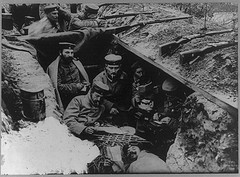How were nations defeated in World War I?
What factors determined when a nation's armed forces collapsed?
Which armies collapsed in World War I?
As we have seen, no army of World War I was capable of mounting a large-scale, rapid offense in the face of determined, entrenched opposition. World War I, particularly on the Western Front, was thus a unique period in which the armies of nations were not defeated by swift maneuver and encirclement. Nor was the capitol of any major belligerent seized, as Paris was in 1870 and 1940. The minor belligerents Belgium, Serbia, and Rumania were overrun, but to almost prove the point the first two remained in the war.
Instead, nation lost the war when their armed forces, and their home fronts, collapsed.
Participants in WWI
Allies who fought from the start:
France, Russia,
British Empire (Great Britain, Canada, Australia,
New Zealand, India, South Africa)
Central Powers who fought from the start:
Germany, Austro-Hungarian Empire
Japan, Italy, Portugal,
Romania, The United States
Countries who later joined the Central Powers:
The Ottoman Empire (Turkey), Bulgaria,
many colonies.

Patriotism: How much the people identified with their state and thus considered its interests to be their interests. While it's always risky to generalize, this level was high in Western Europe (England, France, Germany, and Belgium.), moderate in Russia (which had many minorities, and where many hated the Czar) and Italy (where most weren't sure why they were fighting), and low in Austria-Hungary and the Ottoman Empire, both of which contained many ethnic groups who saw their rulers as foreigners. The United States was somewhere in the moderate or high level of patriotism; it never suffered enough for this to be put to the test.
Likelihood of victory: Soldiers are more wiling to risk death, if they view these risks as temporary, and that something will be gained. On the other hand, if they feel that their lives are being thrown away for no purpose-that their country will not win the war, then they will want it to end sooner (with them alive) than later (with them probably dead). An analogous truth holds to civilians' willingness to put up with deprivations and the loss of loved ones.
A third, but probably less important, factor, is the consequences of victory/defeat. This factor can be extremely important if a people expects to be slaughtered wholesale if they are defeated, but no group in World War I was in this position. It is relatively easy to motivate people to defend their country. It is more difficult to get them to fight on foreign soil. Similarly, it is easier to get a country to agree to an armistice (= cease fire) than to an unconditional surrender.
There are two types of collapse: partial and total.
Partial collapse usually means the army is willing to defend its territory, but the soldiers are no longer willing to attack. It is possible for an army to recover from a partial collapse, given adequate leadership and time to rest. Total collapse is where the soldiers desert or surrender en masse. In that case the country is out of the war.
Various armies collapsed during World War I. Partial collapses were suffered by the armies of Austria-Hungary (1916), Italy (1917) and France (1917). Total collapses were the armies of Russia (1917), and by Austria-Hungary and Germany (1918).
The United States was larger than Germany in terms of both population and industrial output. Thus the United States, particularly when combined with the British Empire and France, had the potential to overwhelm the German army.
The one constraint was time. In 1917, the United States army was miniscule-smaller than that of Belgium. It would take time to train and equip millions of soldiers. Similarly, it would take time to shuttle them across the Atlantic Ocean. In practice, American forces did not begin to fight in significant numbers until the summer of 1918, and even by the end of the war only one Allied front line soldier in ten was American. By 1919 the American army would have been fully committed, and the German army overwhelmed.
The German high command first gambled that their U-boat campaign could knock Britain out of the war. When that campaign failed, it was clear that time was on the side of the allies. (Particularly since by then the allies had by then figured out a way to wage effective, if not brilliant, trench warfare.) Some in Germany wanted to negotiate a peace at that point. However, the German leadership decided to undertake one last gamble: an all-out offensive on the Western Front in the spring of 1918, designed the break the Allied line, and cause the collapse of either the British or the French army, or preferably both.
This offensive (or, more accurately, series of offensives) in the Spring-Summer of 1918 were known as the Ludendorf Offensives.
The Ludendorf Offensives failed. The Germans killed a lot of allied soldiers, but they lost more men than did the allies. They pushed forward, the front line moving further than at any time since 1914, but it was not very far by 1914 standards, and in no case did they reach their objective-they took no territory of strategic significance. (For example, they tried and failed to seize the English Channel Ports from which all British troops and supplies landed.)
By the late summer of 1918, this failure was clear. When the allies began to push the German army back in the fall of 1918, and with the prospect of millions more Americans joining the battle the following year, (By the time the war ended, the American army had 4,000,000 soldiers, of whom 1,000,000 had reached Europe, of whom 500,000 had seen combat.), it became clear that Germany would lose the war, or at best would not win it, and would continue to waste lives and wealth until it sought an armistice.
From the point of view of the individual soldier, once this eventual defeat becomes a certainty, there seems little reason to go on fighting. This was particularly the case, since Woodrow Wilson, the American president, spoke of "Peace without victory" and offered very lenient terms to Germany. Thus, in late October of 1918, the German army began to collapse, and the German government sued for an armistice.
Germany’s allies collapsed for the same reason as Germany collapsed. Germany was the major partner in this alliance. If Germany fell, they would fall as well. Once the Ludendorf Offensives had failed, it was clear that they were on the losing side, and they sought to get out of the war as quickly as possible.

